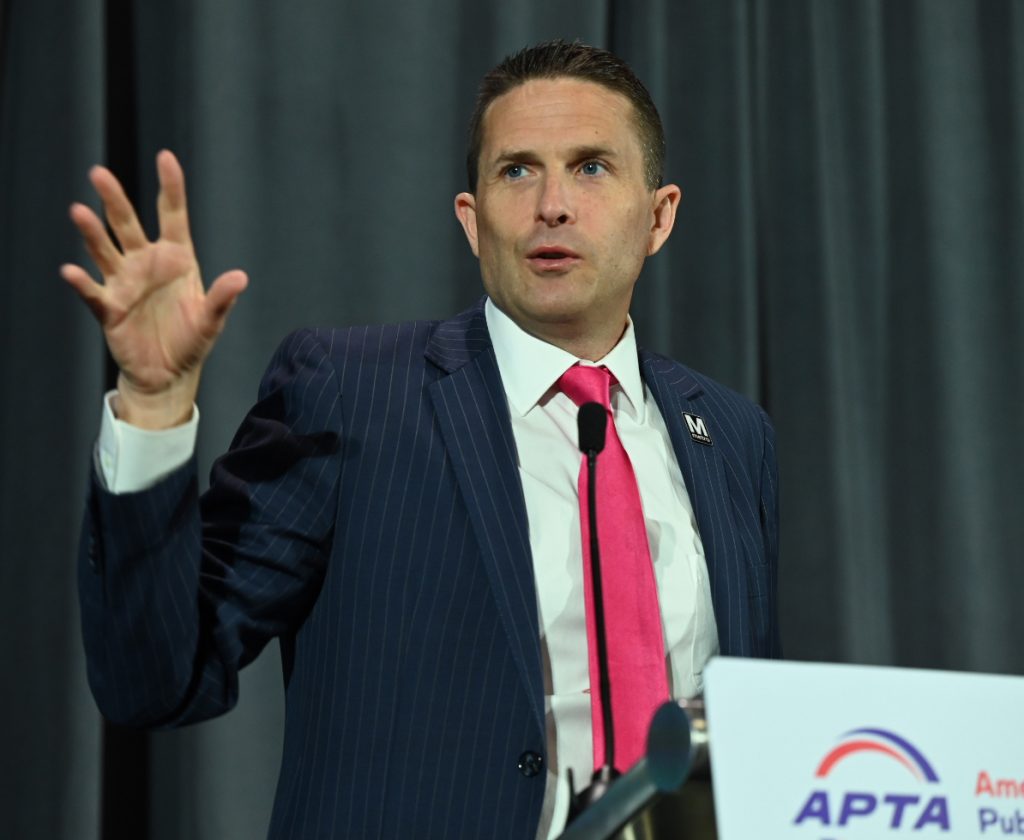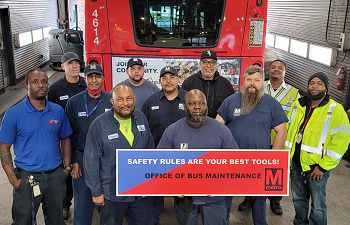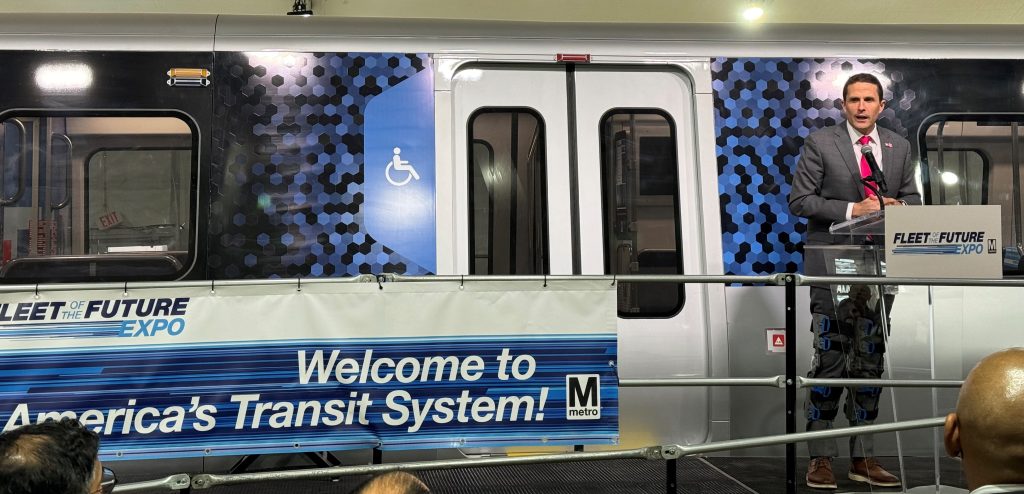WMATA “Is Back” and its Workforce Is Surging in the Right Direction
8/27/2024

“Metro is back!” exclaimed keynote speaker Randy Clarke, general manager and CEO, Washington Metropolitan Area Transit Authority (WMATA/Metro), at the Aug. 22 Opening Ceremony of APTA’s inaugural Workforce Summit, Aug. 21-23 in Washington, DC. “I’m really, really proud of it; Metro is back!”
Clarke explained how WMATA has weathered some financial and other ‘roller coasters,’ of late, but emphasized that the agency is “cooking really well right now, and we’re doing that because of the great team we have.”
He attributes improved customer satisfaction to the positive interaction between employees and customers that came from employees feeling safer in their jobs. “We’ve really taken this serious,” said Clarke. “I can’t overemphasize; if your workforce doesn’t feel safe, they’re never going to give you the full day.”
Improvements in the safety culture at WMATA have not been marked simply in the behavior of passengers, but in operational and workforce practices. “We now have hours of service regarding fatigue management,” said Clarke. “We were one of the only agencies that wasn’t following the APTA standard of rests between shifts. You could technically work 15 straight days for 14 hours a day. Crazy! No one in their right mind thinks that’s safe. So, we worked with the union, and all of our employees are going to be safer, which means our customers are safer.”

Clarke described the minimal unemployment rate in the Greater DC area and the very competitive employment market, which magnifies the typical workforce attraction and retention challenges that the public transportation industry faces. “We have got to recruit, retain, recognize, and reward good employees,” he said. “We now give first-year employees up to four days off for every quarter they work, if they have no safety violations and a great attendance record. We also now give more longevity pay to specific groups, such as elevator and escalator technicians.”
Since the summer of 2022, WMATA has hired almost 2,400 people, 1,000 of which are bus drivers. “These are people that have to come in the door, get a background check, go through all the training, and get certified to do the job. Think of how many people and how much process is behind that,” said Clarke. “We have more bus and rail operators today than we had before the pandemic. We are going to hire people because without people, we can’t run service.”
Clarke noted that the agency has hired its first D, E, & I officer. “It’s one thing to hire people,” he said. “It’s another thing to have people actually care about where they work, feel involved, feel included. Feel that they have a future.”


The agency has also grown its college internship program. This year, WMATA took on 60 interns in all areas, from human resources, to procurement, to civil and mechanical engineering. “We get them immersed,” explained Clarke. “They’re not just doing their project; they are also going out and doing field tours. The more they are exposed to, the more they care about Metro and the more they become all about transit.”
Clarke also described his agency’s apprenticeship, mentorship, leadership, and management programs. “We created a really cool thing called ‘Metro Tank,’ he said. “Basically, it’s Shark Tank, where anyone in the organization can take an idea, put a plan together, and pitch it to a panel and see if they can get buy-in to move their idea forward. Just trying to touch everyone where they are in the organization to make them feel like they’re part of something. When you do that, you usually get results.”
“Everything we do at Metro is community centered, period,” stressed Clarke. After all, “the community is where we’re going to hire from.” He recounted a recent event where members of the community could see and explore WMATA vehicles. “We had 3,000 people show up over two Saturdays. Kids going in the operator cabs, closing doors, getting on a bus, getting on the heavy rail and maintenance equipment, talking to police and K-9 units. Building a sense of pride and having people say, hey, I might be interested in that kind of stuff.”
WMATA hosted its Fleet of the Future Expo this March on the National Mall in downtown Washington, DC. Visitors had the opportunity to explore the agency’s new 8000-series Hitachi railcar mock-up and a new 60-foot New Flyer electric bus. “We had 46,000 people go through the exhibit,” said Clarke. “Think of the potential future workforce we touched, let alone the people that work on Capitol Hill that saw where our vehicles are built and the jobs in America we create!”
Clarke shared a profound sentiment. “It’s about building this organization so people like me come and go, specific employees come and go, board members come and go. But the structure of the institution is stronger, and it keeps moving in the right direction.”
View a recording of the session here.
View more images from the summit here.

Clarke shared a
profound sentiment. “It’s about building this organization so people like me
come and go, specific employees come and go, board members come and go. But the
structure of the institution is stronger, and it keeps moving in the right
direction.”
“Metro is back!” exclaimed keynote
speaker Randy Clarke, general manager and CEO, Washington Metropolitan Area
Transit Authority (WMATA/Metro), at the Aug. 22 Opening Ceremony of APTA’s
inaugural Workforce Summit, Aug. 21-23 in Washington, DC. “I’m really, really
proud of it; Metro is back!” Clarke explained how WMATA has weathered
some financial and other ‘roller coasters,’ of late, but emphasized that the
agency is “cooking really well right now, and we’re doing that because of the
great team we have.” He attributes improved customer
satisfaction to the positive interaction between employees and customers that came
from employees feeling safer in their jobs. “We’ve really taken this serious,” said
Clarke. “I can’t overemphasize; if your workforce doesn’t feel safe, they’re
never going to give you the full day.” Improvements in the safety culture at
WMATA have not been marked simply in the behavior of passengers, but in operational
and workforce practices. “We now have hours of service regarding fatigue
management,” said Clarke. “We were one of the only agencies that wasn’t
following the APTA standard of rests between shifts. You could technically work
15 straight days for 14 hours a day. Crazy! No one in their right mind thinks
that’s safe. So, we worked with the union, and all of our employees are going
to be safer, which means our customers are safer.” Clarke described the minimal
unemployment rate in the Greater DC area and the very competitive employment market,
which magnifies the typical workforce attraction and retention challenges that
the public transportation industry faces. “We have got to recruit, retain,
recognize, and reward good employees,” he said. “We now give first-year employees
up to four days off for every quarter they work, if they have no safety
violations and a great attendance record. We also now give more longevity pay
to specific groups, such as elevator and escalator technicians.” Since the summer of 2022, WMATA has
hired almost 2,400 people, 1,000 of which are bus drivers. “These are people
that have to come in the door, get a background check, go through all the
training, and get certified to do the job. Think of how many people and how
much process is behind that,” said Clarke. “We have more bus and rail operators
today than we had before the pandemic. We are going to hire people because
without people, we can’t run service.” Clarke noted that the agency has
hired its first D, E, & I officer. “It’s one thing to hire people,” he said.
“It’s another thing to have people actually care about where they work, feel
involved, feel included. Feel that they have a future.” The agency has also grown its college
internship program. This year, WMATA took on 60 interns in all areas, from
human resources, to procurement, to civil and mechanical engineering. “We get
them immersed,” explained Clarke. “They’re not just doing their project; they
are also going out and doing field tours. The more they are exposed to, the
more they care about Metro and the more they become all about transit.” Clarke also described his agency’s
apprenticeship, mentorship, leadership, and management programs. “We created a
really cool thing called ‘Metro Tank,’ he said. “Basically, it’s Shark Tank,
where anyone in the organization can take an idea, put a plan together, and
pitch it to a panel and see if they can get buy-in to move their idea forward. Just
trying to touch everyone where they are in the organization to make them feel
like they’re part of something. When you do that, you usually get results.” “Everything we do at Metro is
community centered, period,” stressed Clarke. After all, “the community is
where we’re going to hire from.” He recounted a recent event where members of
the community could see and explore WMATA vehicles. “We had 3,000 people show
up over two Saturdays. Kids going in the operator cabs, closing doors, getting
on a bus, getting on the heavy rail and maintenance equipment, talking to
police and K-9 units. Building a sense of pride and having people say, hey, I
might be interested in that kind of stuff.” WMATA hosted its Fleet of the
Future Expo this March on the National Mall in downtown Washington, DC. Visitors
had the opportunity to explore the agency’s new 8000-series Hitachi railcar
mock-up and a new 60-foot New Flyer electric bus. “We had 46,000 people go
through the exhibit,” said Clarke. “Think of the potential future workforce we
touched, let alone the people that work on Capitol Hill that saw where our vehicles
are built and the jobs in America we create!” [MITCH: add the large image found at the bottom of this
page:
https://aptapassengertransport.com/wmata-kicks-off-fleet-of-the-future-expo/]
The agency has also grown its college internship program. This year, WMATA took on 60 interns in all areas, from human resources, to procurement, to civil and mechanical engineering. “We get them immersed,” explained Clarke. “They’re not just doing their project; they are also going out and doing field tours. The more they are exposed to, the more they care about Metro and the more they become all about transit.”
Clarke also described his agency’s apprenticeship, mentorship, leadership, and management programs. “We created a really cool thing called ‘Metro Tank,’ he said. “Basically, it’s Shark Tank, where anyone in the organization can take an idea, put a plan together, and pitch it to a panel and see if they can get buy-in to move their idea forward. Just trying to touch everyone where they are in the organization to make them feel like they’re part of something. When you do that, you usually get results.”
“Everything we do at Metro is community centered, period,” stressed Clarke. After all, “the community is where we’re going to hire from.” He recounted a recent event where members of the community could see and explore WMATA vehicles. “We had 3,000 people show up over two Saturdays. Kids going in the operator cabs, closing doors, getting on a bus, getting on the heavy rail and maintenance equipment, talking to police and K-9 units. Building a sense of pride and having people say, hey, I might be interested in that kind of stuff.”
WMATA hosted its Fleet of the Future Expo this March on the National Mall in downtown Washington, DC. Visitors had the opportunity to explore the agency’s new 8000-series Hitachi railcar mock-up and a new 60-foot New Flyer electric bus. “We had 46,000 people go through the exhibit,” said Clarke. “Think of the potential future workforce we touched, let alone the people that work on Capitol Hill that saw where our vehicles are built and the jobs in America we create!” [MITCH: add the large image found at the bottom of this page: https://aptapassengertransport.com/wmata-kicks-off-fleet-of-the-future-expo/] Clarke shared a profound sentiment. “It’s about building this organization so people like me come and go, specific employees come and go, board members come and go. But the structure of the institution is stronger, and it keeps moving in the right direction.”